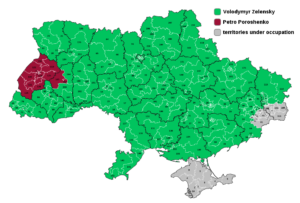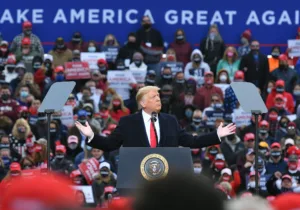On Monday, Volodymyr Zelensky, an ethnic Jew, was inaugurated in Kyiv as the sixth president of Ukraine. With Zelensky’s landslide victory in April with 73 percent of the vote against incumbent Petro Poroshenko, Ukraine became the first post-Soviet state to elect a Jewish head of state and the only country besides Israel to simultaneously have a Jewish prime minister and Jewish president-elect, dispelling the Kremlin narrative that Ukraine is a hotbed of neo-Nazism.[1]
Zelensky is not known for his political prowess, but for his career as a comedian and television star on the popular political satire comedy show Servant of the People where he played a high school history teacher who unexpectedly becomes the president of Ukraine. During the election Zelensky was criticized for having no previous political or governing experience, his ties to the powerful Ukrainian oligarch Ihor Kolomoysky, [2] lack of a clear platform or concrete policy proposals, history of appearing vaguely pro-Russian, and ambiguous political allegiances. All of these criticisms constitute legitimate concerns about Zelensky’s ability to lead Ukraine, which is now in its fifth year of a low-intensity defensive hybrid war against Russia that has killed nearly 13,000 and displaced over 1.3 million.
Despite his critics, Zelensky and his unorthodox campaign were effective as Zelensky opted for using social media to update voters via short posts and videos rather than traditional rallies or journalistic interviews. This strategy helped him win clear majorities in every region of Ukraine, except Lviv, and the occupied territories in Crimea, Donetsk, and Luhansk. Zelensky won in Ukraine’s Russophonic east and Ukrainophonic west. His widespread support across the country undermines the Kremlin narrative that Ukraine is deeply divided by ethno-linguistic or east-west cleavages.
Map credit: Wikipedia Commons
In his inaugural address to Parliament on Monday, Zelensky emphasized the importance of each Ukrainian’s individual responsibility to realize Europeanization, defend Ukraine’s territorial integrity, and continue anticorruption reforms. Zelensky opened his short speech with a robust call to individual responsibility:
Each and every one of us is the president. Not just the 73 percent who voted for me, but the entire 100 percent of Ukrainians. This is not my victory; it is our shared victory. And it is our shared chance for which we all bear responsibility. And just now, it wasn’t only me who took the oath of office. Each one of us placed their hands on top of the Constitution, each one of us took the oath to be loyal to Ukraine. Imagine screaming headlines like “The President does not pay his taxes,” “The President ran a red light after drinking,” “The President steals money in secret—because that’s what everybody does.” You agree that would be a shame. And that’s what I mean by saying that “each one of us is president.”
By directly addressing Ukraine’s post-Soviet political culture in which most citizens have normalized petty crime and corruption amongst themselves, fortified by weak arguments of utilitarianism and argumentum ad populum, Zelensky urged all Ukrainian citizens to take individual responsibility for their actions to create the European future the country seeks. This effectively addressed Ukraine’s larger societal issue where practically all desire political, cultural, and economic reform, but few are willing to take the painful steps necessary to achieve such goals.
Asserting Ukraine’s European aspirations, Zelensky stated:
From today onward, each one of us has responsibility for the Ukraine that we leave behind for our children. Each one of us—being in their jobs—can do everything in their power for the development of Ukraine. A European country starts with each of us. Yes, we chose a path to Europe. But Europe is not somewhere over there. Europe is right here [Zelensky points at his head]. And when Europe is right here, it will be here, too [Zelensky points at his surroundings]. It will be in Ukraine. That’s our shared dream.
To illustrate his emphasis on the need for Ukrainians to assume individual responsibility to achieve Ukraine’s “shared dream,” Zelensky stated he does not want government employees to hang his portrait in their offices, a common practice in both Ukrainian and American government offices:
And please, I really don’t want you to hang my portrait on your office walls. Because a president is not an icon and not an idol. A president is not a portrait. Hang pictures of your children. And before you make any decision, look into their eyes.
In the spirit of his reform promises and desire to promote individual responsibility, Zelensky also quoted former US President Ronald Reagan:
Please let me quote one American actor who turned into a great American president: “Government is not the solution to our problem—government is the problem.” It’s just a quote.
Zelensky, contrary to legitimate concerns of him being pro-Russian, maintained that ending the war in Donbass is his top priority, underscoring the importance of defending Ukrainian territorial integrity:
Our next challenge is to return the lost territories. But, to be honest, I don’t think such wording is correct since it’s impossible to lose something that rightfully belongs to us. Both Crimea and Donbas are Ukrainian lands.
Before concluding his speech, Zelensky called for the adoption of laws to strip members of parliament of prosecutorial immunity, asked for the resignation of the head of the Security Service of Ukraine (SBU), the prosecutor general, and the minister of defense, and announced that he would dissolve Parliament. Snap elections will be held on July 21, a logical move considering that Zelensky is presently at the height of his popularity and his new political party, Servant of the People, currently holds zero seats in the government.
Zelensky’s unorthodox inaugural address aligns broadly with US foreign policy goals and Ukraine’s national interest. It also contains messaging that Western observers should support, as Zelensky nominally endorsed encouraging individual responsibility (a key component to decommunization), defending Ukraine’s national territorial integrity, and continuing much-needed reforms with the goal of Europeanization.
However, talk is cheap. The Ukrainian electorate and foreign observers will be closely watching the Zelensky administration over the upcoming weeks and months. While it is too early to get an accurate read on the Zelensky administration’s actual direction, there have been some concerning recent developments. With Zelensky’s rise to power, Ihor Kolomoysky has returned to Ukraine from his exile in Switzerland, disgraced former Party of Regions affiliates are finding new lobbying opportunities and are being appointed to key government positions, and the dangerous idea of running a national referendum in Ukraine on a tentative peace agreement with Russia is reportedly on the table.
Zelensky should keep to the premises of his inaugural address of continuing Europeanization, driving reinvigorated reforms, and defending Ukraine’s internationally recognized borders. The content of Zelensky’s inaugural address is commendable and he—for now—has the trust of the Ukrainian people. That said, Zelensky should not forget that the last time a Ukrainian president reneged on Europeanization resulted in political suicide and his eventual downfall. Considering his lack of experience in resisting Russian aggression and fighting against the cesspool that is Ukrainian politics’ institutionalized corruption, Zelensky should be careful not to squander this opportunity at such a critical moment in Ukraine’s history.
An English translation of Zelensky’s unredacted inaugural address can be found here.
George Barros is a Washington-based analyst who concentrates on Ukraine and Russia. He previously worked as a foreign policy advisor for a former member of Congress who served on the Subcommittee on Europe, Eurasia, and Emerging Threats. You can find him on Twitter at @curiousgeorgie_
Photo credit: Ukrainian President Volodymr Zelensky is inaugurated at the Verkhovna Rada in Kyiv, Ukraine. By Mykola Lazarenko. Source: The President of Ukraine
[1] This status was short-lived, as Prime Minister Volodymyr Hroysman, a Poroshenko ally, resigned shortly after Zelensky’s inauguration.
[2] Kolomoysky owns 70 percent of the media company whose channel aired Zelensky’s hit show “Servant of the People. Kolomoysky also is a known opponent of Petro Poroshenko because then-President Poroshenko nationalized Kolomoysky’s most lucrative asset and Ukraine’s largest commercial bank, PrivatBank, in December 2016.







